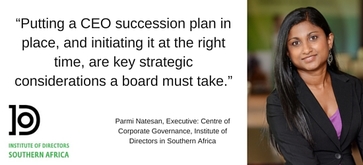 Parmi Natesan Executive, Centre for Corporate Governance at the IoDSA Parmi Natesan Executive, Centre for Corporate Governance at the IoDSA The Institute of Directors in Southern Africa (IoDSA) welcomes the proposed guidelines for reforming the country’s state-owned enterprises (SOEs) recently released by government. Parmi Natesan Executive, Centre for Corporate Governance at the IoDSA comments: “This initiative is most welcome as key parastatals provide the vital enabling environment for economic growth. The IoDSA has in the past noted that many of the challenges currently experienced by SOEs can be traced to inadequate governance.” As highlighted in a recent article, much of the success of Singapore’s public sector is attributed to its adherence to strict governance guidelines. [1] Board performance is strongly linked to organisation performance, which is why both King III and the Companies Act place such emphasis on governance and the function of boards, Natesan points out. Natesan highlights some of the key governance issues for SOEs, as previously highlighted by the IoDSA and that now form part of the government’s reform plan: Maintain the separation of roles Perhaps one the key causes of SOE malfunction is the undue interference of the state in the running of SOEs. This includes short-circuiting the process for board and executive nominations, and issuing instructions to boards that are based on political rather than economic grounds. “If boards are to be accountable for the performance of the SOE, then they have to have the freedom to exercise their collective judgement in its best long-term interests,” she says. “The shareholder must, of course, spell out what the goals of the SOE are, but then it must allow the board and executive management team to do their jobs. The roles for each player need to be better understood and adhered to.” Ensure boards have the right capacity Natesan points out that boards need to have the right mix of knowledge, skills and experience or they cannot perform their strategic and oversight functions adequately. “Making appointments on political grounds alone has been a recipe for underperformance at best, and disaster at worst. SOEs have a unique economic and developmental role, and that must be incorporated into the skills matrix that guides board composition”, she says. Natesan points out that South Africa does have a shortage of professionally qualified and experienced directorial talent. The IoDSA has already put in place a multifaceted plan to grow the talent pool by offering training related to the 20 competencies of its Director Competency Framework. This Framework will enable directors ultimately to achieve the professional Chartered Director (SA) designation. The IoDSA also offers associate membership to allow up-and-coming directors to upskill themselves and build their networks. Board performance must be evaluated regularly Evaluation is the only way for the state, as the shareholder, to assess whether the board is operating optimally, and to identify areas of improvement. Independently facilitated board evaluations provide the board itself, as well as the state as shareholder, with an objective understanding of how well the board is functioning, and what governance areas need to be addressed. “Governance is receiving such attention globally because it improves performance,” Natesan concludes. “South Africa is a leader in this field—let’s hope that government finally benefits from our home-grown expertise to get our SOEs back on track.” ENDS MEDIA CONTACT: Cathlen Fourie, 082 222 9198, [email protected], www.atthatpoint.co.za For more information on the IoDSA please visit: Website: www.iodsa.co.za Twitter: @The_IoDSA LinkedIn: The Institute of Directors in Southern Africa group [1] Greg Mills, “The profit motive: What Singapore can teach Pretoria about business”, Daily Maverick, 15February 2016, available at http://www.dailymaverick.co.za/article/2016-02-15-the-profit-motive-what-singapore-can-teach-pretoria-about-development/#.VsQ9qvJ97ct.
0 Comments
 CEO tenure is one of the trickiest governance questions faced by boards. How do they identify the right time to change CEO? There are no easy answers, says Parmi Natesan, Executive: Centre for Corporate Governance at the Institute of Directors in Southern Africa (IoDSA), but there are warning signs boards should look out for. “CEO performance has a direct link to company performance, which is why best practice around appointing, overseeing and evaluating the CEO is contained in King III,” Natesan explains. “Putting a CEO succession plan in place, and initiating it at the right time, are key strategic considerations a board must take.” Boards do have some research to help them. One study by researchers at the Fox School of Business at Temple University[1] shows that CEOs go through discernible phases, which can help boards identify CEOs heading close to the danger zone. In their early years of tenure, CEOs tend to learn rapidly and take risks, moving onto sponsoring new initiatives and acquiring new skills. Over time, though, they tend to turn inwards, becoming risk-averse and relying overmuch on experience—and possibly obsolete paradigms. The Temple study found that the optimal CEO tenure was 4.8 years, a figure backed up by Fortune magazine’s finding that the 500 largest US companies have a median CEO tenure of 4.9 years. A wider-ranging sample of companies in another study showed variances in median CEO tenure from year to year, possibly linked to economic cycles.[2] A key factor to be borne in mind is the rapid change in the business environment: even the most highly skilled CEO could find his or her skillsets inadequate as time goes by. In addition, CEOs can damage their own reputations by staying too long at one company as opposed to exiting on a high note. “Clearly, boards have to exercise their judgement—one can’t just act by rote and remove a CEO after a certain number of years,” Natesan comments. “But based on the research and accumulated experience, boards should look out for five warning signs.” Flattening corporate performance Falling revenues or market share would be one indicator, but other factors also need to be considered, such as the company’s ability to retain and attract staff, particularly those with the skills and attitude to take the company forward. Complacency within the executive team Annual, in-depth performance reviews are critical, as well as feedback from peers and staff. Additionally, feedback from external stakeholders such as clients and business partners would be valuable. Emergence of a CEO’s court Does the CEO surround him- or herself with weak executives? Board members need to develop ways for assessing the calibre of the people CEOs surrounds themselves with, monitoring new appointments to these roles carefully. Lack of innovation The board should assess how many fresh initiatives originate within the executive team. Innovation quality is also important, so boards will need the expertise to form an opinion as to how valuable this innovation is. Undesirable corporate culture or disquiet Board members should find ways to interact spontaneously with employees to assess how the quality of leadership is perceived and affecting the company as a whole. To do this, board members will have to develop networks within the company. [1] Xueming Luo, Vamsi K Kanuri & Michelle Andrews ‘How does CEO tenure matter? The mediating role of firm‐employee and firm‐customer relationships.’ (2014) 35:4 Strategic Management Journal 492-511. [2] The Conference Board’, CEO Succession Practices, available at https://www.conference-board.org/publications/publicationdetail.cfm?publicationid=2935. ENDS MEDIA CONTACT: Juanita Vorster, 012 664 2833, [email protected], www.atthatpoint.co.za For more information on the IoDSA please visit: Website: www.iodsa.co.za Twitter: @The_IoDSA LinkedIn: The Institute of Directors in Southern Africa group |
Archives
July 2024
Categories
All
|

 RSS Feed
RSS Feed